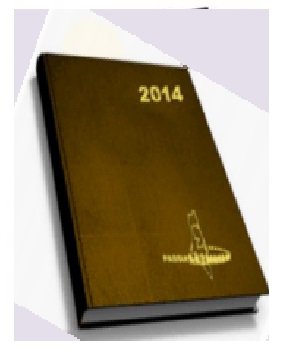PASSIA Diary 2014
The 2013 edition of the PASSIA Desk Diary contained 488 pages and included updated and new addresses, a calendar, and comprehensive information and statistics on relevant events and issues, as they became available throughout the preceding years.
The Desk Diary is organized as follows: The first section, the Directory, contains details of Palestinian and international institutions operating in the Palestinian Territories as well as selected Arab and Israeli organizations located in Israel. The directory has become an invaluable resource for many and is annually updated and corrected. Each entry lists (where available) names of contact persons, phone and fax numbers, e-mail and mailing addresses, websites, and a brief background on an organization’s main fields of work. The directory also includes an index that facilitates the search for a certain entry. Directory entries included the following:
• Palestine Liberation Organization (PLO): Executive
Committee, PLO Departments, Palestinian National Council, Delegations Abroad, Representation in
International Bodies.
• Palestinian Authority (PA): President’s Office, Ministries, PLC (members), Attorney General, Higher Judicial Council, Agencies, Institutions, Commissions and Councils, Police & Security, and Local Government (Governorates, Municipalities & Village Councils).
• Political Parties and Factions
• Academic and Research Centers
• Agriculture.
• Associations & Unions.
• Chambers of Commerce.
• Charitable Organizations.
• Cultural Centers: Art & Galleries, Cultural & Folklore Centers, Film & Cinema, Literature, Museums, Music & Dance, Theater.
• Democracy, Peace & Community Development Centers.
• Diplomatic Missions: Embassies, Consulates, Representative Offices to the PA
• Education: Universities, Colleges, Schools, Training and Vocational Centers, Early Childhood Education, Educational Institutes, and Libraries.
• Environment & Water.
• Financial & Development Institutions: Banks, Credit, Investment & Consulting Companies, Money Changers.
• Governmental Aid Missions.
• Health: Hospitals, Clinics & Centers, Physicians, Pharmacies.
• Human Rights & Law: Human Rights Centers, Law Offices, Lawyers.
• International & UN Organizations.
• Israeli Activist Groups.
• Media & Press (local, regional and international).
• NGOs Operating in Palestine: Coordinating Groups, Foreign NGOs.
• Palestinian Organizations in Israel.
• Religious Forums & Centers (Islamic and Christian).
• Restaurants.
• Services: Accountants, Advertisement, Print & Design, Bookshops & Stationary, Car Rentals,
Computers/Software & IT, Couriers & Express Services, E-mail & Internet, Insurances, Management Consulting & Development, Photo Studios, Planning & Engineering, Real Estate, Telecommunication & Office Equipment,Translation & Editing, and Others.
• Sport Clubs and Fitness Centers
• Trade - Import/Export
• Travel and Tourism: Airlines, Hotels & Resorts, Hospices & Guesthouses, Touristic and Recreational Sites,Travel Agencies, Tourism Companies & Tour Operators, Taxis & Transportation.
• Women's Organizations.
• Youth Organizations.
The second section includes standard features of a Calendar, such as a day by-day planner, calendars for the previous and following years, address and note space, and anniversaries and national holidays of foreign countries. In each calendar page, the 2013 edition includes educational text boxes on Islamic and Christian Holy Places, providing a brief description of them.
The third section of the Diary is the Agenda, a source of information and facts about Palestine and the
Palestinians. The agenda begins with 14 chapters in which the following aspects of Palestinian society and the Palestine Question are described, supported by tables, statistics and suggestions for further research (reading material and website references):
1. Dictionary of Palestinian Political Terms.
2. Israeli Occupation Policies.
3. Geography.
4. Population.
5. Refugees.
6. Land & Settlements.
7. Water & Environment.
8. Economy: Agriculture, Industry & Private Sector, Labor & Employment, Tourism, Trade, Finances.
9. Education.
10. Health.
11. Infrastructure: Housing & Construction, Electricity & Energy, Transport & Roads, Communications.
12. Society & Living Conditions.
13. Government: Administration, Elections, Rule of Law, Negotiations, Police & Security, State of Palestine.
14. Jerusalem: History, Legal Status, Negotiations, Population, Residency Rights, Housing & House Demolitions, Land & Settlements, The Old City, Israeli (Municipal) Policies.
The final part of the agenda comprises a Palestine Chronology of events throughout 2013, a full list of available PASSIA publications, as well as a set of colored maps, illustrating historical and contemporary aspects of the Palestine-Israel conflict, including maps on Israel’s settlement policy and its separation wall, the distribution of refugees and the situation in Jerusalem.
Overview
It was in 1988 that PASSIA’s published its first Diary with the goal to provide a comprehensive “tool” for all those who work in or on Palestine or are interested in the Palestine Question. Every year since then, an annually updated, amended and revised version of the Diary has been published, containing directory of contact information for relevant organizations operating in the West Bank and Gaza – listing names, addresses, main activities – combined with a full day-to-day planner (calendar) of the respective year and a comprehensive compilation of events and statistics related to Palestine and the Palestinians.
PASSIA is very proud to say that its diary has become an invaluable source of information for many people, both locally and abroad, and as yet there is no equivalent publication in Palestine.

